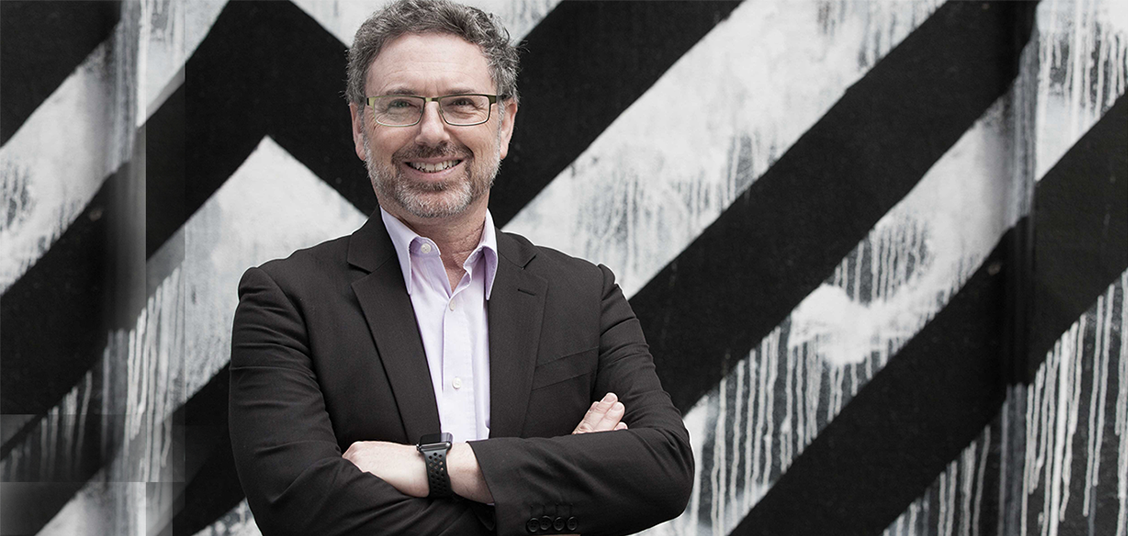Sydney-based human rights lawyer George Newhouse has dedicated his career and much of his time – paid and unpaid – to social justice. Both individually and as part of the National Justice Project (NJP), the not-for-profit legal centre he co-founded in 2016, he has advocated for justice and compassion for First Nations Australians, refugees, immigration detainees, and activists.
Newhouse wears a number of hats. He’s the co-founder and principal solicitor of the National Justice Project and an Adjunct Professor of Law at both Macquarie University and the University of Technology.
This was not the career trajectory that his first professional roles pre-empted. After studying Law and Commerce at UNSW, he was a corporate finance executive with multinational investment banking firm JPMorgan in Sydney and then transferred to New York. From there, he joined Clifford Chance as a capital markets lawyer in London.
Newhouse says, “At university my focus was on getting a job and earning an income to support myself, and soon afterwards I had a young family. I probably wasn’t thinking about a career in social justice at that time, although I was very interested in politics, and I was concerned about social issues.”
Upon his return to Sydney in 1990, working as a lawyer with Swaab & Associates, he pursued his interest in consumer and worker advocacy. From 1999 through to 2007 he was a member of the Consumer Trader Tenancy Tribunal, and a mediator for the Workers Compensation Commission from 2001 to 2010. A self-admitted workaholic, he also managed to find time to be Mayor of Waverley (in the eastern suburbs of Sydney) from 2006 to 2007.
Shaken and disturbed
“After I retired from local government, I attended a lunch with David Marr, who had written a book about refugees [Dark Victory, 2007]. I was shaken and disturbed at what was going on, and I felt ashamed that I hadn’t paid attention to the consequences of Howard government policies [on border control].”
Between 2005 and 2016, his high-profile cases included representing Vivian Solon (unlawfully deported from Australia to the Philippines in 2001) and Cornelia Rau, who was unlawfully detained for 10 months.
“That was a turning point in my career, bringing Vivian back to Australia [in 2005]. Vivian’s is the only case I have found in legal history, and certainly in this country, of a citizen being wrongly deported. I called her brother in Brisbane and offered to help, because her two sons were in Brisbane. She’d been missing for 4 or 5 years at that time.”
In 2009, he assembled a team of lawyers to stop then Minister for Aboriginal Affairs Jenny Macklin and the Rudd Government from engaging in a 30-year lease with town camp associations that Alice Spring town camp residents had protested. Two years earlier, he’d fought a similar battle.
“The Mutitjulu Aboriginal Community were being taken over [in 2007], so we acted for them as well. At that stage, I was acting independently. I also had my own practice at the time, focused on property, commercial law, banking and finance.”
National Justice Project
In 2012, Shine Lawyers hired Dan Mori, the US Marine Lawyer who had represented David Hicks, along with Newhouse, to run Shine Lawyers’ pro bono practice.
“When the bean counters realised the pro bono was a loss maker, Shine Lawyers really helped Dan and me to establish the NJP, a not-for-profit, in 2016. Some of the cases I’ve run over the last two decades were through my own practice, some through Shine Lawyers, and some through the NJP.”
Newhouse co-founded the NJP with Mori and Duncan Fine. As principal solicitor, his remit was then and is now to enable vulnerable individuals and communities to access legal resources, to advocate for human rights and to initiate projects that advance health and justice within Australia and the Pacific.
“I do think that grounding in international law firms really did impact on the approach I’ve always taken in social justice work, and the approach of the NJP. The high intensity of the work and the rigour of late nights, short deadlines and very demanding bosses in commercial law gave me the tools to look holistically and strategically at cases, which I applied to the NJP. We have limited resources and a limited number of cases, so we have to be very strategic about how we run cases.”
“My grounding in international law firms impacted on my approach to social justice work … The high intensity of the work and the rigour of late nights, short deadlines and demanding bosses gave me the tools to look holistically and strategically at cases.”
Newhouse adds, “For years, the founders did not earn any money. We set up the NJP on a shoestring and used our own resources.”
NJP funding comes from three sources: philanthropists, crowd funding (a current campaign has over 30,000 supporters) and costs when the organisation is successful in cases against the government.
“There’s a limit to that, since we do a lot of work at inquests and you can’t recover costs at inquests, but we’re running about 50 cases for refugees and asylum seekers who came off Nauru who have been severely harmed by their treatment, and if we win those cases we will claim costs against government.”
In 2023, the NJP will prioritise running test cases for asylum seekers who were transferred to Nauru and required medical evacuations to Australia; working with peak indigenous health and legal bodies to fight for the elimination of racism in healthcare; the over-representation of Indigenous children in the child protection system; and ensuring that people with disabilities are not disadvantaged in their access to healthcare, work and housing.
Newhouse admits that this work requires personal sacrifices, none of which he regrets.
“There was a financial cost to setting up the NJP; you don’t do it for the money. There’s an emotional cost and it does affect your family life. There are times I’ve had to work on a death in custody case while on family holidays and that cuts into our time, but people have crises out of hours. We address some of these issues by really focusing on the welfare of all of our lawyers and we are very aware of vicarious trauma. We have medical and counselling services for the team regularly.”




